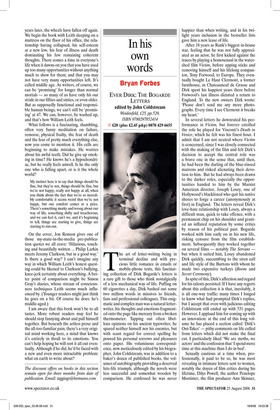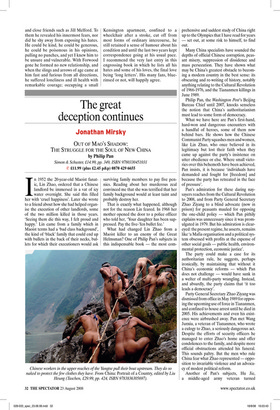In his own words
Bryan Forbes
EVER DIRK: THE BOGARDE LETTERS edited by John Coldstream Weidenfeld, £25, pp.529, ISBN 9780297852414 ✆ £20 (plus £2.45 p&p) 0870 429 6655 The art of letter-writing being in terminal decline and with precious little romance in emails or mobile-phone texts, this fascinating collection of Dirk Bogarde’s letters is a rare gift to those who think nostalgically of a less mechanical way of life. Puffing on 60 cigarettes a day, Dirk bashed out some two million words in missives to friends, fans and professional colleagues. This enigmatic and complex man was a natural letterwriter, his thoughts and emotions fragmented onto the page like mercury from a broken thermometer. Tapping out often libellous opinions on his ancient typewriter, he spared neither himself nor his enemies, but with scant regard for correct spelling he poured his personal sorrows and pleasures onto paper. His voluminous correspondence, now meticulously edited by his biographer, John Coldstream, was in addition to a baker’s dozen of published books, the volumes of autobiography providing a deserved late-life triumph, although the novels were less successful and somewhat wooden by comparison. He confessed he was never happier than when writing, and in his twilight years inclusion in the bestseller lists gave him a new lease of life.
After 18 years as Rank’s biggest in-house star, feeling that he was not fully appreciated as an actor, he first kicked against the traces by playing a homosexual in the watershed film Victim, before upping sticks and removing himself and his lifelong companion, Tony Forwood, to Europe. They eventually bought Le Haut Clermont, a former farmhouse, in Chateauneuf de Grasse and Dirk spent his happiest years there before Forwood’s last illness dictated a return to England. To the new owners Dirk wrote: ‘Please don’t send me any more photographs. Every time I see Clermont it breaks my heart.’ In several letters he downrated his performance in Victim, but forever extolled the role he played for Visconti’s Death in Venice, which he felt was his finest hour. I admit that I am not neutral where Victim is concerned, since I was closely connected with the making of the film and felt Dirk’s decision to accept the central role was a brave one in the sense that, until then, he had been the darling of the blue-rinsed matrons and risked alienating their devotion to him. But he had always been drawn to the darker roles, especially the opportunities handed to him by the Marxist American director, Joseph Losey, one of Hollywood’s blacklisted who quit his native shores to forge a career (anonymously at first) in England. The letters reveal Dirk’s love-hate relationship with Losey, always a difficult man, quick to take offence, with a permanent chip on his shoulder and granted an inflated reputation by some critics by reason of his political past. Bogarde worked with him early on in his new life, risking censure from the film establishment. Subsequently they worked together on several films — notably The Servant — but when it suited him, Losey abandoned Dirk quickly, succumbing to the siren call and life style of the Burtons with whom he made two expensive turkeys (Boom and Secret Ceremony).
In spite of this, Dirk’s affection and regard for his talents persisted. If I have any regrets about this collection it is that, inevitably, it is all one-way traffic: many times I longed to know what had prompted Dirk’s replies, but I accept that even with judicious editing Coldstream still ended up with 531 pages. However, I applaud him for coming up with an innovation: at the end of this long volume he has placed a section called ‘Dirk’s Out-Takes’ — pithy comments on life culled from letters which did not make the final cut. I particularly liked ‘We are moths, we actors’ and the confession that ‘I spend more time at this machine than I do in bed’.
Sexually cautious at a time when, professionally, it paid to be so, he was most revealing in intimate letters sent to women, notably the doyen of film critics during his lifetime, Dilys Powell, the author Penelope Mortimer, the film producer Ann Skinner, and close friends such as Jill Melford. To them he revealed his innermost fears, nor did he shy away from exposing his hates. He could be kind, he could be generous, he could be poisonous in his opinions, pulling no punches, and yet I knew him to be unsure and vulnerable. With Forwood gone he formed no new relationship, and when the slings and arrows of age came at him fast and furious from all directions, he suffered loneliness and ill health with remarkable courage; occupying a small Kensington apartment, confined to a wheelchair after a stroke, cut off from most forms of ordinary intercourse, he still retained a sense of humour about his condition and until the last two years kept correspondence going at his usual pace. I recommend the very last entry in this engrossing book in which he lists all his hates and some of his loves, the final love being ‘long letters’. His many fans, bluerinsed or not, will happily agree.



























































 Previous page
Previous page